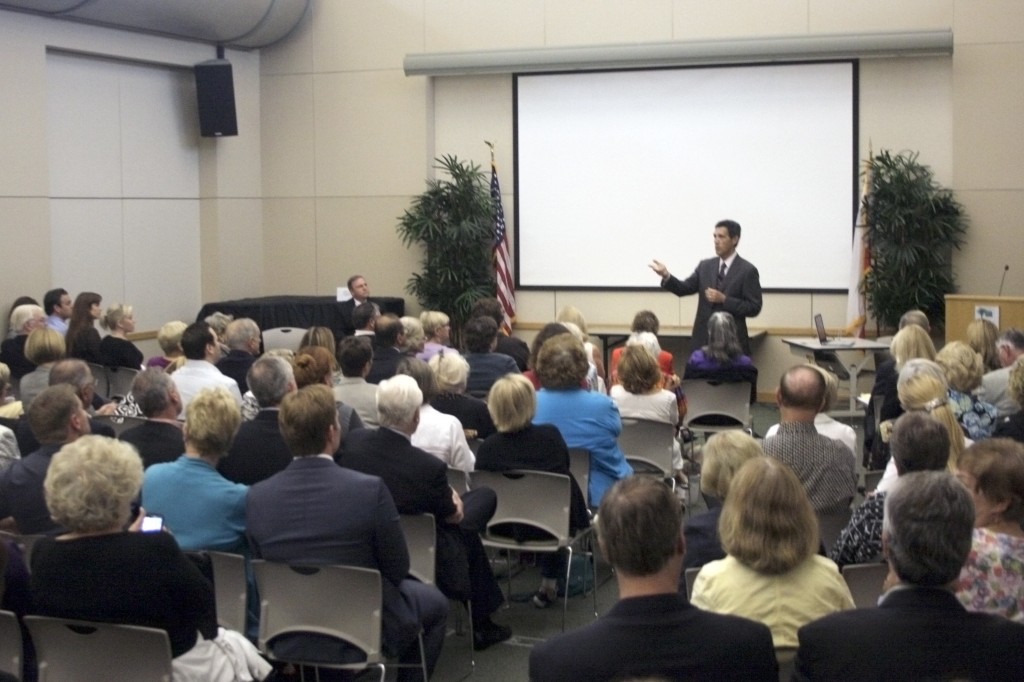
It was standing room only Thursday morning during the Newport Beach Chamber of Commerce’s monthly WAKE UP! Newport event, featuring two Hoag officials.
A crowd of nearly 200 packed into the friends room at the Newport Beach Central Library to hear president and CEO of Hoag Memorial Hospital Presbyterian, Robert Braithwaite, and CEO of Covenant Health Network (the Hoag-St. Joseph Health System alliance), Richard Afable, speak about healthcare reform, technology in medicine, the patient/healthcare provider relationship, and the future of healthcare.
Neither of the Hoag officials mentioned the recent move to stop performing elective abortions that has created controversy in the community. Written questions were collected from the audience, and a few were read aloud for Afable and Braithwaite to answer.None that were read aloud were regarding abortion and both men had to leave before they got through the stack of questions.
In apparent anticipation of protestors, a flyer posted near the registration table stated no posters beyond that point, and there was a noticeable police presence, although there appeared to be no organized protest at the event.
Afable briefly spoke about the Affordable Care Act, or “Obamacare,” and who it would affect and how it would work.
It is meant to “improve access to care,” Afable explained, for those who don’t have access for financial reasons.
It is also attempting to try and get the government out from underneath the huge financial liability that it has, to reduce the expense on the government, he explained.
In order for it to work, about 70 percent of the people that sign up to use the Affordable Care Act in California have to be healthy and use very little services, Afable said. They will pay for the 30 percent of users who use those services, people with underlying illnesses needing medical care.
“It’s here, it’s law, it’s not perfect, but let’s try to make it work,” Afable said.
That’s the healthcare reform that is happening now, Afable explained.
The answer of whether or not it will be successful will not be known for another two to three years.
The next step in healthcare is catering to the consumer. For the first time, consumerism is affecting healthcare, Afable said. The consumer is the winner in that kind of market, he explained. Prices go down, service goes up, and results improve, he added.
“The largest industry that is not affected by consumerism in the United States, maybe the world today, is healthcare,” Afable said. “That’s changing.Right now.”
Braithwaite spoke more about new technology and how the integrated system will benefit patients.
He gave the example of his father, who will be turning 80 this year and has several doctors who didn’t communicate with each other, prescribed him multiple medicines, some of which counteracted each other, and prescribed duplicate procedures.
“Uncoordinated, fragmented care leads to higher cost with sub-optimal outcomes,” Braithwaite explained.
“This speaks to the fragmentation of healthcare,” he continued. “It sets the stage for where Hoag is moving.”
A few things Hoag is working on to make things easier for patients: Online personalized “Patient Portal,” selfscheduling appointments, provider lists including specialty doctors, direct communication with providers, and other ways to use technology to better diagnose, treat and care for patients.
All of this is expected to come as a result of the Hoag and St, Joe alliance.
“We decided to work together in order to respond to the consumer-based marketplace,” Afable explained about the new combined network.
“We’re going to make the care better.We’re going to make the care more affordable. We’re going to provide higher service,” Afable said.





Richard Afable came across as a very smooth spokesperson rather than an advocate for real progress toward health care access for all. I was disappointed in both presentations, especially in their failure to address the recent ban on abortions at Hoag. They managed their time well, allowing for only three questions, one of which was ridiculous. I wish they had demonstrated the courage to address the abortion ban questions. When a serious question was presented, on Hoag’s commitment to honoring end of life directives, they both avoided a direct affirmative answer. They did not inspire confidence in the institutions they operate.